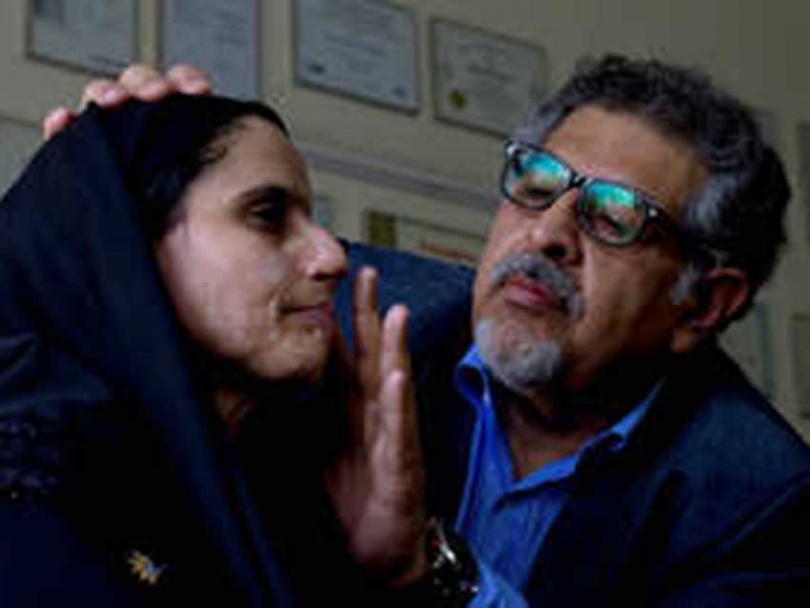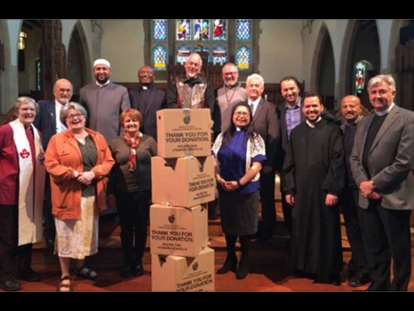 Dr Muhammad Jawad, right, is a pioneering British-Pakistani plastic surgeon who treated the two acid-attack survivors profiled in the Oscarwinning film Saving Face.
Photo Credit: www.princeclausfund.org
Dr Muhammad Jawad, right, is a pioneering British-Pakistani plastic surgeon who treated the two acid-attack survivors profiled in the Oscarwinning film Saving Face.
Photo Credit: www.princeclausfund.org
Mar
Pakistani-Canadian filmmaker Sharmeen Obaid-Chinoy is using her moment in the international spotlight to bring attention to victims of acid attacks in her country of origin.
On Feb. 26, Ms. Obaid-Chinoy, 33, won best documentary at the Academy Awards ceremony for her film Saving Face, which highlights the plight of thousands of Pakistani women who have survived brutal acid attacks by male relatives or female in-laws.
The team behind the documentary has used its website to launch a campaign that aims to raise awareness about the attacks -- inflicted on around 150 women each year in Pakistan -- and to strengthen legislation against the violence.
“The film must be more than an expose of horrendous crimes. It must be a recipe for addressing the problem and a hope for the future,” the film's co-director, Daniel Junge, said on www.savingfacefilm.com.
Ms. Obaid-Chinoy's mother told Agence France-Presse that winning the Oscar had provided her daughter “with a unique opportunity and strength to strive for her goal more effectively”.
“The campaign is mainly aimed at making our society more humane and better to live in. It is to help and remedy those who are victims of such brutality and injustice,” Saba Obaid said.
The 52-minute Saving Face chronicles the work of a British-Pakistani plastic surgeon, Dr Mohammad Jawad, who travels to Pakistan to conduct reconstructive surgery on the victims.
Pakistani official estimates are that 150 cases of acid violence are reported every year in the country. But rights' groups say the real figure is much higher and many cases go unreported mainly in the rural areas where feudal and tribal customs hold sway.
The website said the film, which few have seen in Pakistan, was “uniquely positioned to advance awareness, education and prevention efforts”.
“We're consulting with surgeons, scholars, journalists, activists and other experts, some of whom have also agreed to join our emerging advisory team, in order to maximise the impact of our outreach work,” it added.
The Pakistani government recently passed landmark legislation, increasing the punishment for acid attacks, with attackers facing imprisonment of 14 years to life, in addition to fines of 1 million rupees (around $11,000), according to the BBC.
Nevertheless, activists say there is still a long way to go before the situation on the ground truly changes.
Ms. Obaid-Chinoy, Pakistan's first Oscar winner, dedicated the award to all those who helped her in making the documentary, particularly the two acid victims from Punjab province - Rukhsana, 25, and Zakia, 39 - who are featured in the documentary.
Zakia's husband threw acid on her after she filed for divorce. Rukhsana's husband and in-laws poured acid and petrol on her and then set her on fire. Despite the terrible trauma, Rukhsana, still lives with her husband and his family because she is unable to support her children on her own.
“Zakia, Rukhsana this one is for you,” Ms. Obaid-Chinoy, who was born in Karachi and became a Canadian citizen in 2004, said in a message sent to the media after receiving the Oscar.
Ms. Obaid-Chinoy's victory set-off a wave of jubilation across Pakistan with television networks running special reports on her life and achievements and Twitter followers posting congratulatory messages on her.
“Congrats, Sharmeen! So proud of you. You are a real hero of Pakistan, working for the betterment of our country and improving its image,” said a message on the website of the Pakistani daily, Express Tribune.
Pakistani president, Asif Ali Zardari, and the prime minister, Yusuf Raza Gilani,congratulated Ms. Obaid-Chinoy for highlighting the sensitive topic of acid attacks “with utmost sensitivity and creativity” and announced a civilian award for her.
Mr Zardari said Ms. Obaid-Chinoy brought laurels to the country by “sending a message to the world about Pakistan's softer image”.
The Karachi-based News International newspaper praised her for winning the Oscar but said growing violence against women in the society was a cause of great concern for the country.
“Although the award is a matter of personal and national pride, its content is a matter of national shame,” the newspaper said in an editorial.
Ms. Obaid-Chinoy has directed about a dozen documentaries. According to her office, she plans to return to Pakistan next month where she hopes to screen Saving Face at schools, universities and community centres to create awareness about social issues in the country.
This article was produced exclusively for Muslim Link and should not be copied without prior permission from the site. For permission, please write to info@muslimlink.ca.












